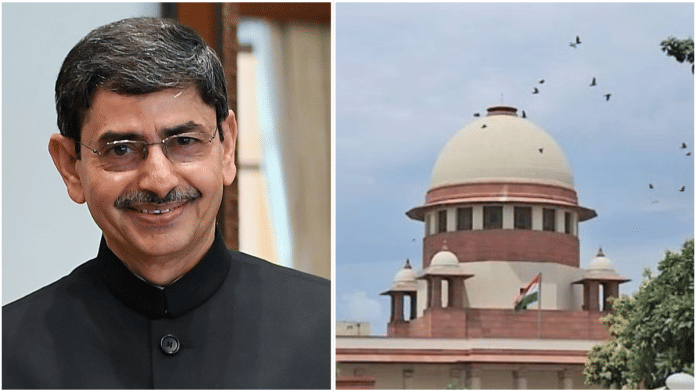New Delhi: The Supreme Court Tuesday laid down the timelines within which the Governor of a state must decide on the bills passed by the state legislature. In a significant judgment, the top court also held that a Governor’s decision will be subject to judicial review, in case there is non-compliance of the timelines.
The ruling, pronounced by a Bench led by Justice J.B. Pardiwala, came as it declared Tamil Nadu Governor R.N. Ravi’s action of withholding assent for 10 bills—the oldest of them pending since as far back as January 2020—and referring them to the President after they were re-enacted by the state legislature, as “illegal and erroneous”. The verdict comes in a plea by the Tamil Nadu government against the Governor.
The Bench set aside Ravi’s decision, declaring that any consequential steps taken by the President on the 10 bills were also deemed illegal.
In doing so, the Bench held that a Governor does not have a veto or absolute power to sit over bills sent to him by a state legislature. This power is derived under Article 200 of the Constitution that contains only three options for the Governor when he/she receives a bill for approval from the state assembly. A Governor can exercise this power only with the aid and advice of the council of ministers, the bench held, affirming the position taken in the past by the top court on the issue.
Since Article 200 is conspicuously silent on the time frame within which the Governor must take a call on a Bill’s status, the top court found it appropriate to lay down the timelines. It did so in the backdrop of the stalemate that has persisted between the Tamil Nadu government and the Governor over the status of the 10 bills.
“There is no expressly specified time limit for the discharge of the functions by the Governor under Article 200 of the Constitution. Despite there being no prescribed time limits, Article 200 cannot be read in a manner which allows the Governor to not take action upon this, which are presented to him for assent and thereby delay, and essentially roadblock law making machinery in the state… Whenever a bill is presented to the Governor, he is under a constitutional obligation to adopt one of the three courses of action available,” observed the court.
According to the judgment, in case the Governor decides to withhold assent and reserve the Bill for President’s consideration, the same must be done within a period of maximum one month. In case of withholding of bills, which is contrary to the advice of the state government, the Governor shall return the bills with a message within a period of maximum three months.
In case of presentation of a bill after re-consideration by the state assembly, the bills are to be assented to the Governor within a month, the court declared, observing that a Governor cannot withhold assent or reserve it for the President’s consideration, when he receives the same bill for the second time after it has been re-considered by the assembly.
In Tamil Nadu’s case, the bench held that the Governor had shown “scant respect” for SC’s judgment delivered in 2023 in the “State of Punjab” case, where the Aam Aadmi Party-led government and the Punjab Governor were embroiled in a bitter litigation over approval of bills by the latter. The top court had, in that case, had ruled that the Governor cannot sit over bills indefinitely, and must proceed to either approve or send them back.
With respect to Governor Ravi’s actions, the Bench said Tuesday that it was forced to exercise its inherent powers to declare the 10 bills re-sent to him by the state legislature as “deemed to have got assented”. It was pushed to give this declaration in view of the unduly long period of time for which the bills were kept pending by the Governor, and for the other “extraneous considerations that appear to be writ large in discharge of his functions”.
(Edited by Mannat Chugh)
Also read: ‘Like a goat’s beard’ — KK Shah to RN Ravi, decades-old saga of DMK’s dislike of governors






